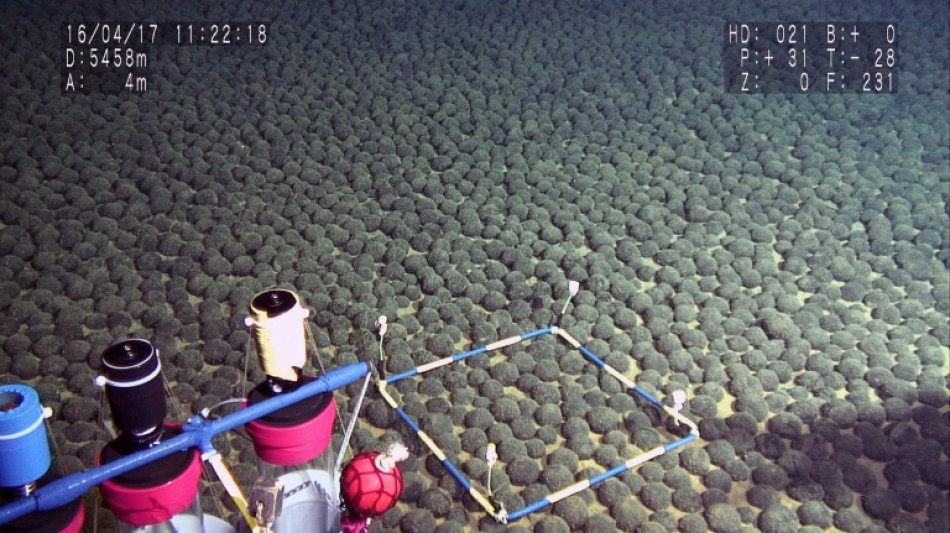
-
 Mourinho Chelsea return prompts old memories, mixed feelings
Mourinho Chelsea return prompts old memories, mixed feelings
-
'Predators': how reality TV explains Epstein obsession

-
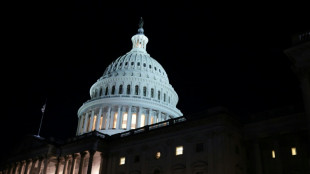 Most Asian markets track Wall St higher after US inflation data
Most Asian markets track Wall St higher after US inflation data
-
India, Pakistan trade accusations after Asia Cup trophy debacle

-
 Power-packed Australia favourites to rewrite World Cup history
Power-packed Australia favourites to rewrite World Cup history
-
Latin artist Bad Bunny to headline Super Bowl half-time show

-
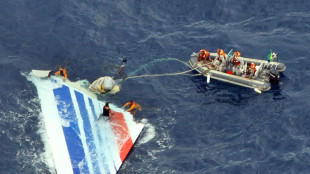 Air France, Airbus back on trial over doomed 2009 Rio flight
Air France, Airbus back on trial over doomed 2009 Rio flight
-
India's divine designs meld with AI at Durga Puja festival

-
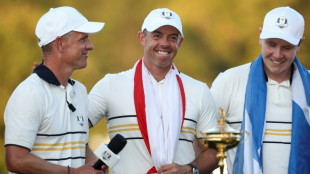 Donald won't rule out Ryder Cup captain return after Europe win
Donald won't rule out Ryder Cup captain return after Europe win
-
Who is Matthieu Blazy, the new man at Chanel?

-
 'New chapter': Paris Fashion Week to showcase industry makeover
'New chapter': Paris Fashion Week to showcase industry makeover
-
Bradley on US Ryder Cup loss: 'This is no one's fault but mine'

-
 Four killed in attack on northern US Mormon church
Four killed in attack on northern US Mormon church
-
Bradley calls for Ryder Cup rule change for injuries
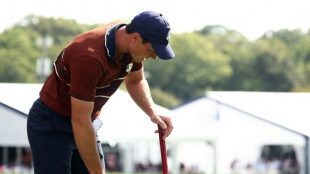
-
 McIlroy slams 'unacceptable' Ryder Cup heckling
McIlroy slams 'unacceptable' Ryder Cup heckling
-
Embattled Australia telco giant hit by another major outage

-
 Mahomes leads resurgent Chiefs in Ravens rout, Eagles stay unbeaten
Mahomes leads resurgent Chiefs in Ravens rout, Eagles stay unbeaten
-
Moldova's pro-EU party tops polls hit by Russian meddling claims

-
 Europe win emotional Ryder Cup triumph after US fightback
Europe win emotional Ryder Cup triumph after US fightback
-
Two dead after shooting, fire at US Mormon church

-
 Europe must step up efforts to protect environment: report
Europe must step up efforts to protect environment: report
-
Eagles down Bucs to stay unbeaten, Bills march on

-
 Incumbent absent as Cameroon presidential campaigning picks up
Incumbent absent as Cameroon presidential campaigning picks up
-
AC Milan beat champions Napoli to make Serie A title statement

-
 Scores arrested on second day of Morocco protests: NGO
Scores arrested on second day of Morocco protests: NGO
-
'One Battle After Another' debuts top of N. America box office

-
 Two dead after US shooting, fire at Mormon church
Two dead after US shooting, fire at Mormon church
-
Mitchell open to coaching first Women's Lions in 2027

-
 Vagnoman sends Stuttgart past Cologne in Bundesliga
Vagnoman sends Stuttgart past Cologne in Bundesliga
-
Stars turn out for Armani's final collection in Milan

-
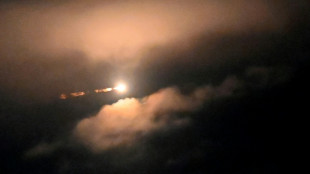 Massive Russian drone and missile attack kills four in Kyiv
Massive Russian drone and missile attack kills four in Kyiv
-
Arsenal showed 'ambition' of title winners in Newcastle win: Arteta

-
 Free Picasso park to open in Paris in 2030
Free Picasso park to open in Paris in 2030
-
Barca beat Real Sociedad to top Liga as Yamal returns

-
 Arsenal strike late for 'beautiful' Newcastle win, close in on Liverpool
Arsenal strike late for 'beautiful' Newcastle win, close in on Liverpool
-
Barca beat Real Sociedad to go top as Yamal returns

-
 Kildunne says 'no reason' England can't win Rugby World Cup again
Kildunne says 'no reason' England can't win Rugby World Cup again
-
Arsenal strike late to beat Newcastle, close in on Liverpool

-
 Lyon win at Lille to stay level at top of Ligue 1 with PSG
Lyon win at Lille to stay level at top of Ligue 1 with PSG
-
Zurich votes to ban petrol leaf blowers

-
 Starmer warns UK Labour in 'fight of our lives' as party meets
Starmer warns UK Labour in 'fight of our lives' as party meets
-
Namibia deploys 500 soldiers to fight Etosha fire
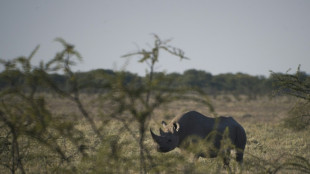
-
 Ryder Cup start host steps down after expletive-filled McIlroy chant
Ryder Cup start host steps down after expletive-filled McIlroy chant
-
Kuldeep helps India bowl out Pakistan for 146 in Asia Cup final

-
 Dominant Europe on the brink of historic Ryder Cup triumph
Dominant Europe on the brink of historic Ryder Cup triumph
-
Injured Hovland withdraws from Ryder Cup as Europe moves closer to win
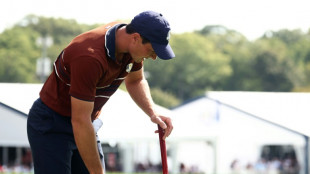
-
 Roma beat Verona to join Napoli at Serie A summit
Roma beat Verona to join Napoli at Serie A summit
-
Watkins sparks Aston Villa revival for first Premier League win

-
 Pogacar defends cycling world title with solo run
Pogacar defends cycling world title with solo run
-
No handshake again as India bowl against Pakistan in Asia Cup final


China carefully assembling a deep-sea mining strategy
In a world hungry for crucial resources, China may not be poised to start deep-sea mining but it is planting seeds for such operations in a meticulously planned economic and geopolitical strategy.
The world's oceans, both international waters and those under national jurisdiction, are rich in minerals and metals, like cobalt, nickel and copper.
These are important for building electric car batteries, for instance, and other technologies as countries try to transition away from fossil fuels.
China "is an energy-thirsty country. It will look for resources everywhere," including the deep sea, said Julia Xue of Shanghai Jiao Tong University.
But she said China is not particularly anxious over the issue, although recent developments -- one company is itching to be the first to start mining the sea bed -- may put more pressure on Beijing.
A Canadian firm, The Metals Company, has filed an application with the United States to begin undersea mining in international waters.
Using its American subsidiary, it acted after President Donald Trump, bypassing international negotiations, signed an executive order in April to speed up the permit-issuing process for such mining in US and international waters.
Trump cited an obscure 1980 US law that says American citizens can explore for and recover deep sea minerals in areas beyond the country's jurisdiction.
Environmental groups are outraged by Trump's order, arguing that a wild hunt for the potato-sized, metal-containing nodules could harm fragile undersea ecosystems.
The Canadian company initially said it would submit its request to the International Seabed Authority (ISA), a body which has jurisdiction over the ocean floor in international waters.
The Metals Company says it ignored this authority because of its slow pace in talks on adopting a mining code that establishes rules for exploiting seabed resources. The United States is not an ISA member.
A long-time observer of those talks who spoke on condition of anonymity said China is not particularly worried about who starts mining first.
"For them it's more about dominance, staying competitive in the game, and giving the impression that you can't mess with us," the observer said.
With that goal in mind "they're definitely developing the technology and putting the strategic agreements in place," Alex Gilbert, a researcher at the Payne Institute for Public Policy at Colorado School of Mines, told AFP.
For instance, China has reached an agreement with the Cook Islands to explore for minerals in that Pacific country's waters.
Another tiny Pacific nation, Kiribati, also says it is exploring a deep-sea mining partnership with China.
This approach is "more geopolitical than economic," said Emmanuel Hache of the French Institute for International and Strategic Affairs, noting Beijing is using undersea mining as a lure to cement greater diplomatic support as it exerts power.
China holds five contracts handed out by the ISA to look for resources in the Pacific and Indian Ocean sea beds and these contracts cover all types of undersea mineral resources. China's is the largest number of the 22 contracts the organization has granted.
- Years behind -
"From a research perspective, we have been continuously getting closer. And from a technical perspective, we have been continuously improving," said Chen Xuguang, a researcher at Ocean University of China.
In 2024 a Chinese prototype deep-sea mining vehicle called Pioneer II, developed by Shanghai Jiao Tong University, set a national record by operating at a depth of more than 4,000 meters (13,100 feet).
State-owned Beijing Pioneer Hi-Tech Development Corporation told AFP that later this year it plans a seabed nodule collection test.
Still, China is not as advanced technologically as The Metals Company, experts say.
"I would characterize China as being two to four years behind them in terms of their technology," said Gilbert in Colorado.
Hache, the French expert, put the gap at five years.
But China has an advantage over firms like the Canadian one in recovering and processing nodules: its companies are supported by the state and China has infrastructure for processing metals.
The observer of the international seabed talks said China does not need seabed mining for metal supply, "but maybe geopolitically, in the context of maintaining their control over the commodities market."
China wants to keep its options open, this person said.
And while it supports an international mining code, China does not need one now and "they're not going to put pressure until they've decided strategically that they're ready," said Gilbert.
R.Buehler--VB
